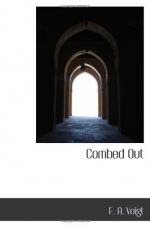So this was our first day in the army. How many more days of drill would we have to endure? Perhaps we would be sent to the front soon. That would be a change at least. I tried to visualize the future. What would actual warfare be like? I thought of bayonet charges and men falling under machine-gun fire. Then I recollected having heard somewhere that a soldier can take an active part in a modern war without ever seeing the enemy, and I imagined a low range of distant hills dotted with little puffs of smoke. I could not, however, realize the precise mental state of a soldier under fire, so that none of these pictures seemed convincing to me. I wondered whether I would be anxious, nervous, terrified, excited, exuberant, or calm and indifferent in the presence of danger, but I could not arrive at any conclusion. Even the term “under fire” conveyed no precise meaning. Nothing I had read about the present war was of any help to me. The reports of the war-correspondents in the daily press were so full of obviously false psychology, that I regarded them as obstacles in the way of a proper understanding of modern warfare, and no doubt that was partly the object with which they were written or rather inspired. I knew that within a few weeks I might be dead or terribly mutilated, but as I could not visualize the precise circumstances the prospect only filled me with an indefinite uneasiness. The possibilities before me were too vague and too numerous, and I did not possess sufficient knowledge to estimate them accurately. I did not even know whether I would remain in a fighting unit. I hoped we would be sent to the front soon, for the one thing I feared was a prolongation of the dreary round of infantry drill. Moreover I was intensely curious as to the real nature of war and eager to experience new sensations and conditions. Nevertheless, from time to time I felt a wild desire to run away and enjoy a few days of freedom, but the realization of the futility of such a wish always brought on a fit of such black despair that I tried not to think about it at all.
II
THE FATIGUE PARTY
There was much gaiety amongst us. There was also much gloom and bitterness. We would often quarrel violently over nothing and enrage over little inconveniences—intense irritability is the commonest result of army life. Our morale was dominated by the small, immediate event. Bad weather and long working hours would provoke outbursts of grumbling and fretful resentment. A sunny morning and the prospect of a holiday would make us exuberantly cheerful and some of us would even assert that the army was not so bad after all. A slight deficiency in the rations would arouse fierce indignation and mutinous utterances. An extra pot of jam in the tent ration-bag would fill us with the spirit of loyalty and patriotism. If an officer used harsh, brutal words we would loathe him and meditate




